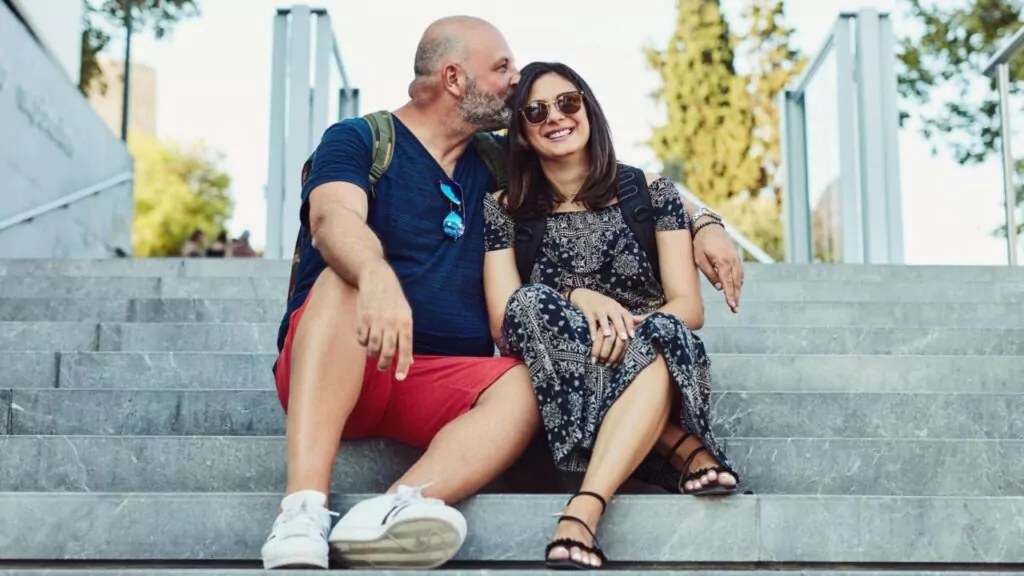Dealing with loss is hard, and finding companionship again can be a delicate process for widowers. Many choose a friends with benefits relationship as a step towards feeling connected once more.
Our article gives vital tips to help widowers enter these relationships wisely, ensuring both fun and respect. Read on for thoughtful guidance that makes sense of it all.
Understanding Friends with Benefits (FWB) Relationships for Widowers
Friends with benefits relationships offer widowers a way to connect with someone and enjoy physical intimacy without the deep commitment of a serious relationship. These casual connections can help fulfill sexual desires while also providing some companionship.
It’s crucial for widowers to understand that an (FWB) arrangement is not about replacing their lost love but finding comfort and understanding through this period of their lives.
For a widower, entering into an (FWB) relationship requires honesty with themselves and their partner about what they want and expect from the arrangement. They need to make sure both people agree on the rules and boundaries to keep things clear.
This type of relationship should be built on mutual respect and consent, ensuring that it brings happiness rather than adding stress or emotional complications.
Why do Widowers Seek Friends with Beneficial Relationships?
Widowers may gravitate towards friends with beneficial relationships as they tentatively step back into the world of intimacy and connection. They often seek these non-committal engagements to fulfill emotional and physical needs without the weight of a serious partnership.
Not Ready for Committed Relationships
Some widowers are not ready to dive into something serious right after losing a spouse. They might still be healing from their loss and aren’t emotionally prepared for the weight of a new commitment.
A friends-with-benefits relationship offers them care and closeness without the pressure of long-term promises.
They find comfort in casual interactions that don’t demand more than they can give. This setup allows them to connect with someone on a physical level, which can boost their confidence during a tough time.
It’s important for both people to understand this situation clearly to keep things simple and enjoyable.
Desire for Physical Intimacy
Widowers often miss the warmth and closeness of a partner. They crave the touch, comfort, and sexual intimacy they once shared with their spouse. Losing a partner means losing a part of themselves that was fulfilled by physical connection.
Seeking out friends with benefits allows them to meet those needs without diving into another deep relationship.
Physical intimacy can be healing for someone going through grief. It offers moments when widowers can connect with another person in a meaningful way. This helps them feel alive and eases the loneliness that comes from losing a loved one.
A friends-with-benefits relationship provides these intimate experiences without demanding more than they’re ready to give emotionally.
Exploration of Sexuality
Exploring sexuality can be a big step for a widower. After losing their spouse, they may want to discover what they enjoy and desire now. A friends-with-benefits relationship lets them experience this without the pressure of commitment.
They can meet their sexual needs and feel desired again. This kind of relationship helps them figure out what feels good.
It’s important to always practice safe sex in these relationships. Using barrier methods like condoms protects both partners’ health. Emotional support from a friend with benefits can also help widowers navigate new sexual encounters.
They learn about trust, intimacy, and pleasure all over again while keeping things casual.
Desire to Feel Desired
Feeling wanted is a powerful emotion. Widowers might seek out friends with benefits to experience this again. It helps them feel attractive and worthy of attention. After losing a spouse, they may doubt their appeal to others.
A casual relationship offers a space where they can be admired without the pressure of commitment.
Being desired boosts self-esteem too. For widowers, this can be part of healing after loss. They enjoy the thrill that comes from flirting and being intimate without strings attached.
This kind of connection ensures their emotional needs are met while they navigate new forms of companionship.
Regaining Confidence
Losing a partner can shake someone’s confidence. A widower might feel unsure about dating or starting new relationships. Friends with benefits allow them to connect without the pressure of commitment.
They get to enjoy physical intimacy, which boosts their self-esteem. It can be comforting for a widower to know someone finds them attractive.
Regaining this confidence helps in other areas of life too. It encourages widowers to meet new people and try fresh experiences. Enjoying time with an FWB partner brings back feelings of joy and excitement that may have been lost.
This is a step towards healing and finding happiness again after loss.
Signs a Widower is Ready for a (FWB) Relationship
Discerning whether a widower is open to a no-strings-attached arrangement involves keen observation of his actions and communication. Watch for consistent, clear signals that he’s comfortable engaging casually without the weight of emotional expectations.
Initiates Contact
A widower ready for a friends-with-benefits relationship often reaches out first. He might send texts, call, or suggest hanging out. This step shows he’s interested in more than just talking.
He feels comfortable moving things forward and isn’t shy about making his intentions clear.
His actions speak volumes about what he wants. If he touches your arm, leans in close, or finds reasons to be near you, these are signs of physical comfort. A widower initiating contact is taking the lead into new territory after loss, showing readiness for intimacy without a serious commitment.
Comfortable with Physical Intimacy
Some widowers find comfort in physical intimacy without a deep emotional bond. They enjoy the closeness and touch of another person. This can signal they are ready for a friend with a benefit setup.
Being with someone physically often helps them feel wanted again, giving them a boost in self-esteem.
For these men, being intimate without the strings of commitment fits their current needs. It is vital to ensure both people want this type of connection and respect each other’s boundaries.
With clear understanding and mutual consent, widowers can engage in sexual activity that enriches their well-being while honoring where they are emotionally.
Respectful of Boundaries
A widower who understands and respects your boundaries shows he values the FWB relationship. He will not push for more than you are willing to offer. This respect allows you both to maintain a comfortable level of intimacy without commitment.
Knowing that personal limits are honored makes the experience safer and more enjoyable for both partners.
Clear communication plays a crucial role in setting these boundaries. It helps avoid misunderstandings and ensures that both parties remain on the same page regarding their expectations from the relationship.
A widower mindful of your space and emotional well-being demonstrates empathy, which is essential in maintaining a healthy casual hookup or any form of connection after such a significant loss.
Not Pressuring for Commitment
Widowers might want a friend with benefits because they’re not looking for strings attached. It’s important that you both understand this from the start. Clear expectations mean no one is waiting for the relationship to become something more.
Enjoy each other’s company and focus on having fun today. Avoid talking about long-term plans or saying things that could sound like you expect a deeper commitment.
Keep it simple and let him set the pace of the relationship. If he feels comfortable, he may open up over time without any pressure from you to make things serious. Remember, it’s all about enjoying the present moments together and respecting personal boundaries every step of the way.
How to Approach a Widower for a FWB Relationship?
Start by being honest with the widower about your intentions. A clear and gentle conversation can set the stage for a friends-with-benefits relationship. Be open about what you want from this arrangement, and ask him how he feels about it.
Make sure you both agree on the FWB rules to avoid any misunderstandings later on.
Use a compassionate tone when talking to him. This shows respect for his past experiences while expressing your desires. Ask questions that show you care, like how comfortable he is with physical intimacy or if he’s looking for companionship without commitment.
Remember that emotional readiness differs from person to person, especially for someone who has lost a spouse.
Maintaining a Casual (FWB) Relationship with a Widower
Keep your FWB relationship with a widower simple and relaxed. Talk openly about what you both want from this casual link. This helps stop any confusion or hurt feelings later on. Make plans to meet only for dates that are meant for fun and intimacy, nothing more.
Respect where the widower is in his grieving process. He might have tough days, so be patient and understanding about his emotional state without pressing him for more commitment. Share laughs and good times together, but stay aware of each other’s boundaries.
Remember that no strings attached means just that—enjoy the moments without expecting them to lead somewhere else.
Transitioning from a (FWB) Relationship to a Serious One: Is It Possible?
Moving from a friends-with-benefits situation to a serious relationship can happen, but it takes work. It starts with clear, honest talk about feelings and what both people want. Just because your relationship began casually doesn’t mean it can’t grow into something deeper.
You might feel scared to bring up the topic, but open communication is key. Listen to each other carefully, and decide if you’re both ready for more commitment. Take things slowly; let your bond strengthen over time as you share more experiences together.
Trust and respect will build, paving the way for a possible long-term connection beyond just physical intimacy.
Dealing with Family and Friends’ Opinions on a (FWB) Relationship
Family and friends might have strong opinions about your (FWB) relationship. They may worry about you or not understand your choices. Listen to their concerns, but remember, you make the final decision.
Explain that this arrangement meets your needs right now. It’s okay to keep details private if sharing too much causes stress.
You can ask for support without giving away all the information. Let them know how important their understanding is to you. Assure them that you’re thinking carefully about this relationship.
Show confidence in your choice, and they’ll often come around with time.
Ending a (FWB) Relationship with a Widower: Tips to Avoid Hurt
When the time comes to conclude a friend-with-benefits liaison with a widower, navigating the emotional terrain carefully is crucial. Employ compassionate communication and clear intentions to ensure the parting is as painless as possible for both parties involved.
Being Honest
Be honest with your widower friend with benefits. Clear communication is key to making sure both of you are on the same page. Tell him what you expect from this relationship, and listen to his expectations too.
If feelings change or things get complicated, it’s important to talk about it right away.
Honesty helps prevent hurt feelings in the future. You should speak up if you no longer want the friends with benefits arrangements. Share your thoughts kindly but firmly. This will show respect for yourself and for him as you end things on good terms.
Choosing the Right Time and Place
Pick a quiet, private place to talk with the widower about ending your friends with benefits relationship. Make sure it is somewhere you both feel safe and won’t be interrupted. Choose a time when neither of you is rushed or stressed.
This helps ensure that both of you can focus on the conversation and respect each other’s feelings.
Avoid public spaces where emotions could attract attention. Don’t pick times when he might be dealing with heavy emotions, like an anniversary of his loss. Respect his space by asking if it’s a good moment for a serious talk.
Your consideration shows care for his emotional state, as discussed before ending your relationship.
Acknowledging the Good Times
In any relationship, it’s important to honor the positive moments you’ve shared. With a friends with benefits setup involving a widower, reflecting on enjoyable experiences can soften the end of your casual connection.
Talk about the laughs you had and the comfort you provided. It shows respect for what was good between you both without diving into deeper emotional waters.
Celebrate those moments that brought joy and intimacy without expectation of something more. This approach helps maintain a friendship even if the beneficial part is coming to an end.
You’re acknowledging that, while the arrangement may not last forever, it was meaningful in its own way for both of you.
Conclusion
Navigating a widower’s friend with benefits relationship takes careful thought. Many widowers look for these connections to feel close to someone again. It is okay if they are not ready for love yet.
Widowers might want friends with benefits for many reasons. They miss being close to someone. Some just want fun without being tied down. Others might feel alone and need company.
When a man who has lost his wife wants a casual friend, he shows signs. He will call or text you first. He won’t push you into anything serious too fast.
To start this kind of friendship, talk openly with the widower about what you both want and expect from each other in the relationship.
Keep it simple when dating a widow casually. Set boundaries together so no one gets hurt feelings.
Sometimes, casual relationships can turn into something more serious over time as affection grows between two people.
What others think about your relationship can be tough to handle; remember that your happiness matters most!
Ending things gently is best if the arrangement isn’t working out anymore—be honest, pick the right moment, and say goodbye nicely by thanking them for the good times shared together.
As an expert named Dr. Jane Smith would advise, understanding your emotions is key in friends-with-benefits relationships—especially after losing a spouse! With years of counseling experience and research under her belt, she suggests always making sure everyone involved knows what they’re getting into before starting this type of relationship.
Dr. Smith says clear conversations set expectations right from the start—you avoid confusion later on this way!
In terms of safety and ethics, it’s vital! Always respect each other’s boundaries and communicate honestly throughout your time together.
Dr. Smith recommends keeping things low-key; that helps keep feelings from getting too deep if either person isn’t ready for more commitment.
Weighing pros against cons matters here—remember there may be more emotional risks than other types of dating setups due to past experiences of loss.
Make sure it fits well within daily routines—if it causes stress or sadness instead of joy, then re-evaluate whether this situation is healthy moving forward.
Dr. Smith stresses balance: enjoy moments, but stay aware of how quickly bonds form when sharing intimate times!
Her final piece? Be mindful whether such arrangements truly benefit those involved emotionally, as long-term fulfillment often requires stronger foundations beyond physical connection alone.
























